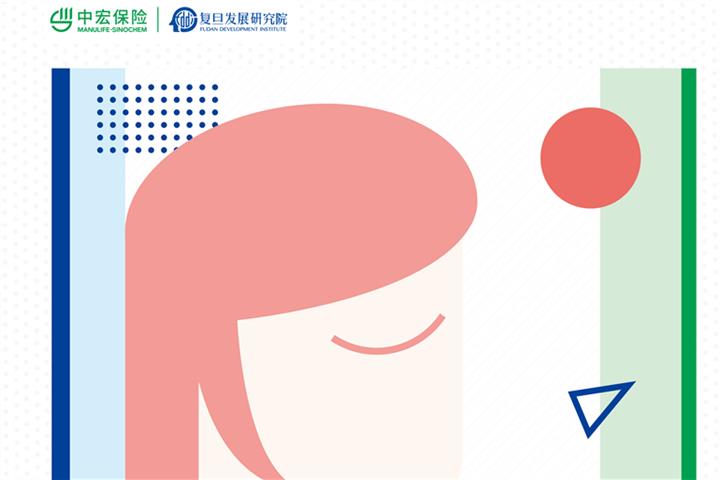 Manulife-Sinochem and Fudan Development Institute Collaborate on China’s First Women Retirement Risks Management Whitepaper
Manulife-Sinochem and Fudan Development Institute Collaborate on China’s First Women Retirement Risks Management Whitepaper(Yicai Global) Aug. 28 -- Manulife-Sinochem announced today with the Fudan Development Institute (FDDI), to co-launch the first retirement risks management whitepaper focusing on Chinese women. The whitepaper reveals that there is not enough awareness and readiness amongst woman about the risks associated with retirement, especially as women are more susceptible to health risks as they age. Less than half (47.44%) of Chinese women interviewed said they have pension insurance policies. In terms of the choice of protection, interviewees were generally worried about large medical expenditure, accessibility to care services, accidents, and insufficient income.
China’s population is aging – a trend that is expected to reach its peak somewhere between 2030 and 2050. The proportion of women among the total population aged 65 years or over is projected to rise. The study shows that females have a longer life expectancy, which leads to a higher demand for wealth accumulation. However, the current penetration of commercial protection coverage among Chinese women is quite low, showing a significant gap in demand for retirement protection.
Kai Zhang, CEO of Manulife-Sinochem said, “We are in the second year of strategic partnership with FDDI. In line with our continued attention to women’s health and retirement needs, this year’s whitepaper focuses on multiple risk factors women may face in their retirement. The search shows that there’s significant retirement income gap for women. We believe that increased awareness leads to better solutions – it is necessary for women to put together retirement plan at an earlier stage with appropriate wealth management and risk considerations, dynamically adjust financial plans with different financial instruments. Commercial insurance is an important supplementary tool to bridge the retirement gap, helping women to strive for greater financial freedom and worry-free retirement.”
For the purpose of comparison, this year’s whitepaper draws on the questionnaire results and data collected from1,406 randomly selected women and 269 randomly selected men who reside in 14 major cities. The whitepaper noted that health risk management is a key requirement amongst women planning for retirement. Almost 80% of women interviewed named health as their top retirement priority. When it comes to what they worry about the most, the four major retirement concerns are all related to health. Seventy-two percent of women interviewed considered being “capable of affording medical costs” as important, at the very least, while 54% agreed that “access to medical resources” was very important. In addition, the health risks women face is also worrying, as research shows that 30.83% of female interviewees responded that they consider themselves to be of under sub healthy status. Risk of illness is also higher for older women. According to the statistics, 77.6% of Chinese women over the age of 60 have more than one chronic disease (higher than men, at 75%), which reflects the pressing health risks that older women face.
Moreover, the gap in women’s retirement preparedness is also significant. The women interviewed started to plan for their retirement at an average age of 43.8 years old. Only 8.8% of them realize that they should have started doing so earlier. Compared with the limited income they earn before retirement, the surveyed women’s expectations for retirement spending are not modest. The whitepaper notes that interviewed women expect an annual budget of RMB 240,000 to 480,000 per year after retirement, while their average income ranged from RMB 100,000 to 290,000. This is not enough to match the quality of life they would like to sustain during retirement, especially if they have dependents, like parents and children to take care of, nor is it enough to cope with potentially-high-cost health risks later in life. Even more worrying is the fact that only 28.52% of women believe that they may overspend. The whitepaper’s findings concluded that Chinese women’s awareness and preparation towards retirement planning is inadequate.
Although commercial insurance can provide better protection for women preparing for the risks associated with retirement, the whitepaper also found that less than half of women (47.44%) hold a pension policy, which can be considered less than ideal in terms of penetration rate and will not be able to help them meet their own expectations. Among the samples in Shanghai, 17.14% of women are self-employed and 5.19% are housewives. In other words, more than one-fifth of women lack pension protection under the second pillar, reflecting an unfavorable scenario for them to face.
By investigating women’s willingness to increase the percentage of total annual household income spent on insurance, the study constructs a forward-looking model predicting the demand for pension products. The model shows an increasing appetite for pension insurance, with investment as a percentage of total annual household income, expected to increase from 5.89% to 8.87%.
Professor Zhang Yi, Executive Vice Dean of FDDI, said, “This whitepaper, the first of its kind on the retirement risks facing women, is helping women identify their retirement focus and shining a spotlight on the gap in front of them, as well as proposing appropriate solutions, which is a blank slate in current academic research. The risks faced by women cannot be ignored, and the penetration of female protection has gradually become an important social issue. We admit that addressing women’s predicaments in retirement is a major challenge. Women should be more aware of insurance as a financial tool to amplify protection with leverage to transfer the health risks associated with old age and wealth management against inflation.”